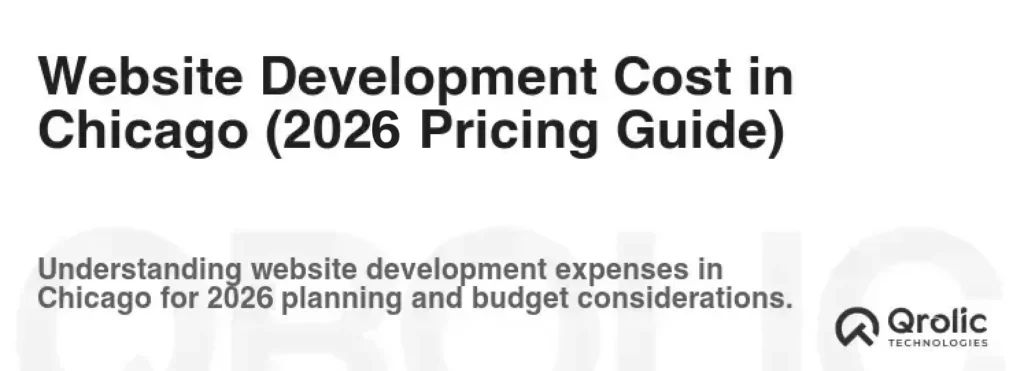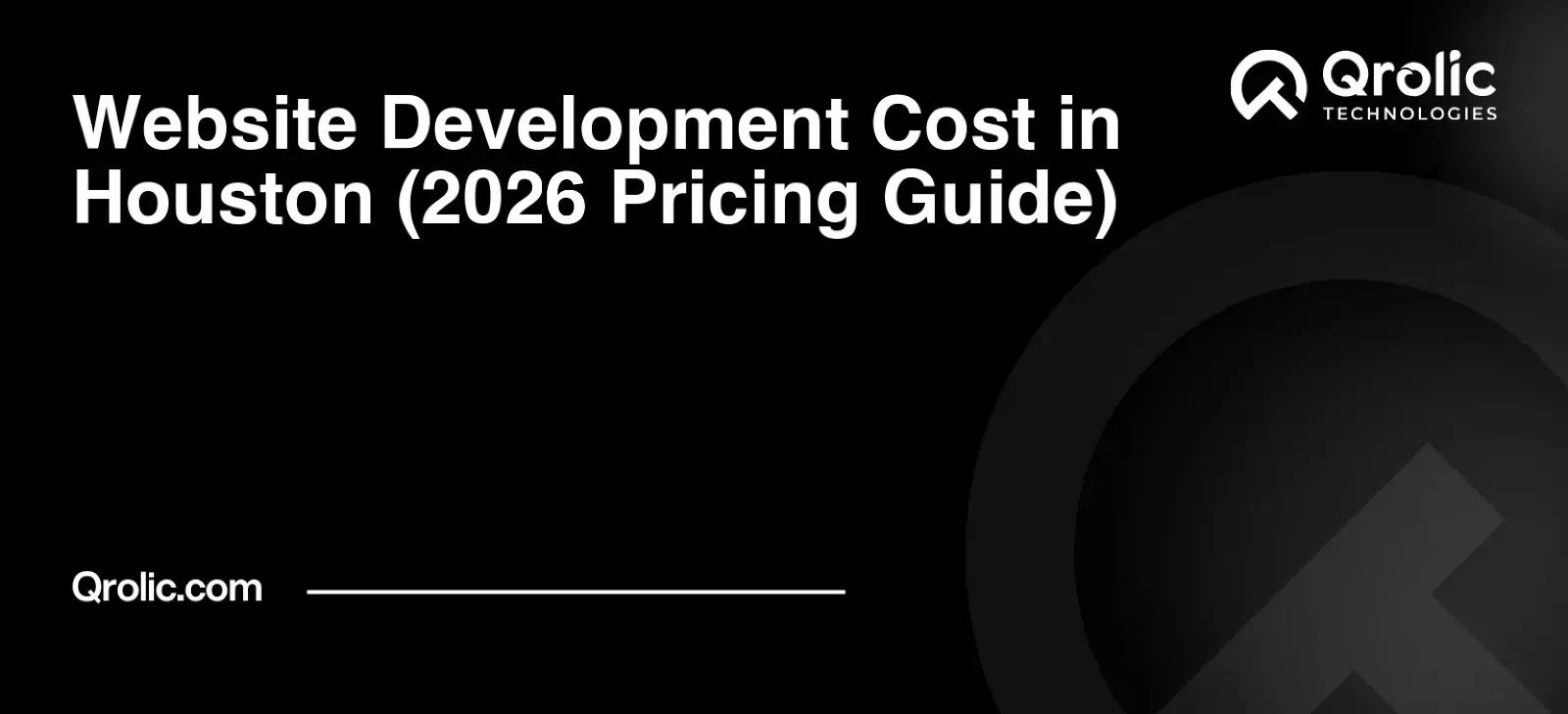Quick Summary:
- Website cost varies by type, features, and design.
- Expect $2,500 for basic, much more for custom sites.
- Budget for ongoing hosting, security, and maintenance.
- Clear goals and a local partner optimize your budget.
Table of Contents
- Website Development Cost in Houston (2026 Pricing Guide)
- The Big Picture: Average Senior Care Website Cost in 2026
- 2026 Pricing Tiers at a Glance
- Why Senior Care Websites Cost More Than “Standard” Business Sites
- 1. High-Level ADA Compliance (The Legal & Moral Mandate)
- 2. HIPAA and Data Security
- 3. The Emotional User Journey (UX/UI Design)
- Detailed Breakdown of Development Costs
- Phase 1: Strategy and Discovery (,000 – ,000)
- Phase 2: Design and User Experience (,000 – ,000)
- Phase 3: Content Creation and Storytelling (,000 – ,000)
- Phase 4: Technical Development and Integration (,000 – ,000)
- The “Invisible” Ongoing Costs
- 1. Premium Hosting and Security (0 – 0/month)
- 2. Ongoing SEO and Answer Engine Optimization (AEO) (
,500 – ,000/month)
- 3. ADA Maintenance (0 –
,500/year)
- How to Choose the Right Partner: Qrolic Technologies
- Steps to Determine Your 2026 Website Budget
- Step 1: Define Your Goals
- Step 2: Audit Your Current Digital Presence
- Step 3: Prioritize “Must-Have” Features
- The Benefits: Why High Costs Often Mean Higher ROI
- Frequently Asked Questions (FAQ)
- 1. Can I use a website builder like Wix or Squarespace?
- 2. How long does it take to build a senior care website?
- 3. Should I put my prices on my website?
- Summary of Senior Care Website Cost in 2026
Website Development Cost in Houston (2026 Pricing Guide)

In the senior care industry, 2026 marks a pivotal shift. We are no longer in an era where a website is a “nice-to-have” digital business card. Today, your website is your most valuable employee. It is the compassionate voice that comforts a stressed daughter at 2:00 AM, the virtual tour guide for a family across the country, and the high-tech portal that ensures medical transparency.
As the “Silver Tsunami” reaches its peak, the competition for high-quality care has intensified. Families are more tech-savvy than ever, and their expectations for speed, accessibility, and transparency have reached an all-time high.
But with these rising expectations comes a complex question: What is the actual senior care website cost in 2026?
This comprehensive guide breaks down every financial angle of building and maintaining a world-class senior care website, ensuring you can make an informed decision that balances heart-led care with business-minded ROI.
The Big Picture: Average Senior Care Website Cost in 2026
The cost of a website in the senior care sector is dictated by the level of trust and functionality you need to build. In 2026, pricing has stabilized into four primary tiers based on the scale of the facility and the complexity of the technology integrated.
2026 Pricing Tiers at a Glance
| Website Type | Estimated Build Cost (USD) | Annual Maintenance | Best For |
| The Starter (Small Agency/Niche) | $4,000 – $9,000 | $1,200 – $3,600 | New home care startups, local solo providers. |
| The Growth Engine (Mid-Range) | $12,000 – $35,000 | $4,000 – $10,000 | Established assisted living, multi-location agencies. |
| The Enterprise (Custom Platform) | $40,000 – $120,000+ | $12,000 – $50,000 | Luxury CCRCs, national franchise networks. |
| Medical/App Integrated Portal | $80,000 – $250,000+ | Variable | Telemedicine-focused sites with EHR integration. |
Why Senior Care Websites Cost More Than “Standard” Business Sites
If you’ve looked at the cost of a local plumber’s website, you might be shocked by these numbers. However, senior care Web Development involves high-stakes variables that standard business sites don’t face.
1. High-Level ADA Compliance (The Legal & Moral Mandate)
By April 2026, new Department of Justice (DOJ) mandates regarding web accessibility have become the industry standard. For senior care, this is critical.
- Vision Support: High-contrast modes, screen-reader optimization, and scalable fonts.
- Motor Impairment Support: Ensuring the site is fully navigable via keyboard for those with tremors or arthritis.
- Cognitive Accessibility: Clean, jargon-free layouts that don’t overwhelm users.
- Cost Impact: Expect to pay a 15% to 25% premium for true, audited ADA compliance (WCAG 2.1 Level AA or higher).
2. HIPAA and Data Security
If your website features a “Contact Us” form where a family mentions a loved one’s dementia or health status, that data is sensitive. In 2026, security breaches in the healthcare sector are met with massive fines.
- Secure Servers: Specialized hosting that meets medical-grade security standards.
- Encrypted Forms: Ensuring data is shielded from the moment a user hits “submit.”
3. The Emotional User Journey (UX/UI Design)
Designing for a 55-year-old woman in a “sandwich generation” crisis (caring for kids and parents) requires a specific psychological approach. The design must be:
- Calming: Using soft palettes and professional, warm photography.
- Instructive: Guiding them through “How to Pay” or “Levels of Care” without confusion.
- Trust-Focused: Prioritizing reviews, testimonials, and staff credentials.
Detailed Breakdown of Development Costs
Phase 1: Strategy and Discovery ($2,000 – $7,000)
A professional team doesn’t just start coding. They spend weeks researching.
- Market Analysis: What are your local competitors offering?
- SEO Keyword Research: Identifying terms like “respite care in [City]” or “best memory care near me.”
- Sitemap Planning: Organizing complex information (pricing, amenities, floor plans) into a logical flow.
Phase 2: Design and User Experience ($4,000 – $20,000)
This is where the “soul” of your community is captured.
- Custom UI Design: Moving away from generic stock photos toward authentic storytelling.
- Mobile-First Design: Since over 75% of initial searches in 2026 happen on mobile devices while families are on the go.
Phase 3: Content Creation and Storytelling ($3,000 – $15,000)
Content is no longer just words; it’s the medium of trust.
- Professional Copywriting: Compassionate, SEO-optimized text that ranks in search engines (and Answer Engines like AI overviews).
- Video Production: In 2026, video is king. “Day in the Life” resident stories and 360-degree virtual tours ($1,500 – $5,000) are now standard expectations.
Phase 4: Technical Development and Integration ($5,000 – $50,000)
The “engine” of your website.
- CMS Setup: Typically wordpress or a custom headless CMS for lightning-fast speeds.
- CRM Integration: Connecting your website leads directly into platforms like Enquire or Sherpa (adds $1,000 – $4,000).
- Interactive Tools: Cost calculators and “Which Care Level Do I Need?” quizzes that capture high-intent leads.
The “Invisible” Ongoing Costs
Budgeting for the initial build is only half the battle. To keep your senior care website performing at its peak, you must account for recurring expenses.
1. Premium Hosting and Security ($100 – $500/month)
Cheap $10/month hosting will result in slow load times and security vulnerabilities. For senior care, you need:
- Daily Backups: To ensure no data is lost.
- CDN (Content Delivery Network): To make images and videos load instantly.
2. Ongoing SEO and Answer Engine Optimization (AEO) ($1,500 – $5,000/month)
Search engines in 2026 prioritize “Freshness” and “Authority.”
- Blog Posts: Answering common family questions about Medicare, hospice, or senior wellness.
- Local SEO: Keeping your Google Business Profile synced with your website.
3. ADA Maintenance ($500 – $1,500/year)
As you add new blog posts or images, your site can fall out of compliance. Annual or bi-annual accessibility audits are necessary to avoid legal risk.
How to Choose the Right Partner: Qrolic Technologies
Selecting a developer for a senior care website is a high-stakes decision. You need a partner who understands both the technical rigor of 2026 web standards and the delicate emotional landscape of the aging industry.
This is where Qrolic Technologies excels.
Qrolic is not just a Web Development agency; they are architects of digital trust. Their specialized approach to senior care includes:
- Accessibility Expertise: Building sites that meet and exceed 2026 ADA and WCAG 2.1 standards, ensuring no senior or family member is left behind.
- High-Conversion Design: Using data-driven UX patterns specifically designed to increase “Book a Tour” and “Download Brochure” conversions.
- Seamless CRM Integrations: Ensuring your sales team gets lead data in real-time, allowing for the rapid response times that families now expect.
- Scalable Solutions: Whether you are a local home care agency or a national senior living brand, Qrolic builds platforms that grow with your census.
By partnering with a team like Qrolic, your senior care website cost transforms from an “expense” into a high-yielding asset that builds your community’s legacy.
Steps to Determine Your 2026 Website Budget
Step 1: Define Your Goals
Are you looking to fill three empty beds in a boutique facility, or are you looking to dominate the digital landscape for a 10-location franchise?
- Lead Gen Focused: High investment in SEO and landing pages.
- Information Focused: High investment in depth of content and FAQ sections.
Step 2: Audit Your Current Digital Presence
Is your current site slow? Is it non-compliant? If you are starting from a “broken” foundation, the cost may be higher to remediate and rebuild.
Step 3: Prioritize “Must-Have” Features
In 2026, the “Must-Haves” include:
- Mobile Responsiveness.
- ADA Compliance.
- Virtual Tour Integration.
- Transparent Pricing Information.
The Benefits: Why High Costs Often Mean Higher ROI
It is tempting to cut corners, but a “cheap” senior care website usually results in:
- High Bounce Rates: Families leaving the site because it feels cold or confusing.
- Legal Liability: Lawsuits stemming from non-accessible design.
- Low Quality Leads: Getting calls for services you don’t provide because the content was poorly written.
Conversely, a professionally built 2026 website offers:
- Shortened Sales Cycles: Families arrive for a tour already knowing your prices, care levels, and philosophy.
- Higher Occupancy Rates: A steady stream of organic leads reduces your reliance on expensive third-party referral agencies.
- Brand Authority: Becoming the “Go-To” resource for aging information in your local community.
Frequently Asked Questions (FAQ)
1. Can I use a website builder like Wix or Squarespace?
In 2026, while these platforms have improved, they often struggle with the heavy customization required for medical-grade security and full ADA compliance audits. For a professional facility, a custom or semi-custom CMS build is usually the minimum standard.
2. How long does it take to build a senior care website?
A basic site takes 6–8 weeks. A mid-range site takes 3–4 months. A complex enterprise platform with custom portals can take 6 months or more.
3. Should I put my prices on my website?
Yes. In 2026, the #1 complaint from families is lack of pricing transparency. Even a “Starting At” price increases your website’s trust factor and filters out unqualified leads.
Summary of Senior Care Website Cost in 2026
Building a website for the senior care sector today is about more than just aesthetics; it’s about accessibility, security, and deep empathy. While the initial investment—ranging from $12,000 to $35,000 for most quality providers—may seem daunting, it is the primary driver of modern census growth.
By investing in a platform that prioritizes the user experience of the adult child and the accessibility needs of the senior, you aren’t just building a website. You are building a bridge between a family in need and the care your community provides.






